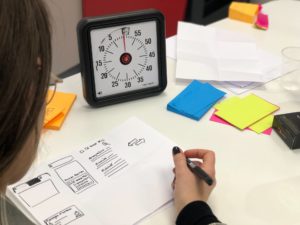“Your English is awful!” – my boss shouted across the busy newsroom.
I was shocked, mortified, and my only thought was, “I’m gonna lose this job”.
If you’ve ever been ashamed of your English, you know the feeling. There’s nothing pleasant about it.
In this post, I will share with you a proven and effective way that helped me to improve my English skills and saved my job
The Compound Effect
I survived thanks to the compound effect: the result of small daily actions that you take for a while.
At first, you see no changes. But after doing it consistently for a long period of time you feel improvements.
Let me give you an example. If you read 10 pages of a book a day, it will be 300 pages in a month, 3650 pages in a year, and 10 950 in 3 years. This is how one small daily action makes you a well-read and educated person in the end.
But there is the tricky part. Those actions seem so insignificant that it’s easy to stop taking them. In this case, the compound effect works in the opposite direction.
Let’s say you and your friend (same age, similar physical shape) decided to go jogging for 30 minutes every day. You stuck to it for a week.

Then one of you quit and got back to old habits. Another kept jogging.
We won’t see the difference in the shape and health of the friends, not a week or in a month, not even in 3 months. But in a year or more we’ll probably witness the consequences of healthy life and life with almost daily alcohol and junk food consumption.
How is it all connected with English?
If you’ve been learning English for a long time, you probably know that there are ups and downs. And it often depends on how often you use the language.
Let’s say on a trip or during the English course your knowledge and skills are usually in good shape.
Once you stop practicing, you see the decline. After several weeks you start forgetting words, constructions, rules. Your English becomes rusty. In several months you suddenly realize that you can’t make a simple sentence without hesitation.
We’ve all been there.
How to fix it?
You probably also did it before. You renewed your practice, started reading, speaking.
In other words, you got back to practice. The best is to do it consistently on a daily basis.
Don’t get me wrong. You don’t need to spend hours on English every day. Start from 10 min a day, but do it every day. Then increase that time to 30 minutes and then maybe to 1 hour. And you’ll see results. Sooner or later.

Why am I so sure? Because that’s what I did. Of course, back then, I had no idea of the compound effect. What moved me forward was the fear of losing the job.
So, every morning on my way to work, I read news only in English and tried to understand new words, expressions, and events. I spent 30-40 min but I did it every single day.
And it worked. Not in a week or two, but in several months I became better in translation then I had been before.
Sure, it’s not the only example of small daily actions that could help you to improve your English. I’ve seen and experienced similar things during the Fluency Challenge (link), Lingoda Marathon (link), and a university program (link).
Now, what exactly do you need to do?
Here’s an action plan:

- Identify your goal Why do you learn English? Do you want a better job? What kind of job? Do you want to read literature in English? What authors? The less vague your answer is the more chances that you will take actions and won’t quit once it becomes hard to stick with the routine.
- Identify your struggles in English
To improve, you need to know what your flows are. You can identify them by yourself (for instance, using this Fluency Wheel) or hire a teacher who could help you. - Create a daily routine that is easy for you to follow
Start from 10-30 min but do it every day. If it’s reading, read (1-2 pages a day), if it’s speaking, speak (10-20 minutes a day). If it’s pronunciation, practice with drills or tongue twisters (10-20 minutes a day).
Now I’m eager to know if you experienced the compound effect in English or any other areas of your life. And if yes, share it in the comments or email me on vika@about-english.com.
For those who want to go deeper here’re some useful links:
1. Darren Hardy’s YouTube video where he explains the nature of the Compound Effect and here’s his book on Amazon, you can also find it on audible.
2. Hadar Shemesh’s podcast episode about the Compound effect in English. She gives a concise definition and shares some cool examples from Darren Hardy’s book and her own life and work.
3. Brooke Castillo’s episode podcast about the Compound Effect and her experience.
4. Hadar Shemesh’s video about Fluency Wheel: how to identify your main struggles in English and fix them.







Thank you so much, for this a piece a advice, i am following your ideas, i am every single day i have a daily routine, i Read un english, sometime i feel happy because i am understanding almost all, in other bad day, i dont undertand nothing, but i know that the process yo have up and down